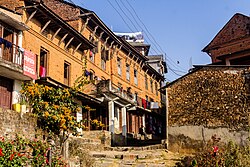Tanahun District (Nepali: तनहुँ जिल्ला pronounced [tʌ.nʌ.ũ] ⓘ, or [tʌnʌɦũ]), a part of Gandaki Province, is one of the seventy-seven districts of Nepal. The district lies in central Nepal, with Damauli as its district headquarters. It covers an area of 1,546 km2 (597 sq mi) and has a population (2011) of 323,288. Previously the town of Bandipur was its district headquarter. The postal code of Tanahun is 33900.
Tanahun District
तनहुँ | |
|---|---|
 Bandipur | |
 Location of Tanahun (dark yellow) in Gandaki Province | |
| Country | Nepal |
| Province | Gandaki Province |
| Established | 1872 |
| Admin HQ. | Damauli (part of Byas Municipality) |
| Government | |
| • Type | Coordination committee |
| • Body | DCC, Tanahun |
| Area | |
• Total | 1,546 km2 (597 sq mi) |
| Population (2011) | |
• Total | 323,288 |
| • Density | 210/km2 (540/sq mi) |
| Time zone | UTC+05:45 (NPT) |
| Telephone Code | 065 |
| Website | ddctanahu |
Bhanubhakta Acharya (Nepali: भानुभक्त आचार्य; 1814–1868), a Nepalese poet and writer who translated the great epic Ramayana from Sanskrit to Khas language, was born to a very Brahmin family in Chundi Ramgha in Tanahun on 29 Ashar, 1871 B.S. He received education with a strong leaning towards religion from his grandfather at home. He is honored with the title Adikabi for the contributions he has made in the field of poetry and Khasi literature, and every year his birthday (29th of Ashad) is celebrated as a festival of Bhanujayanti by conducting various programs, usually academics and poem recitation.
Chimkeswori is the highest hill of Tanahun.[citation needed]
Coordinates and location type
edit- Latitude: 27.91667
- Longitude:84.25
- Latitude (DMS):27° 55' 0 N
- Longitude (DMS):84° 15' 0 E
Geography and climate
edit| Climate Zone[1] | Elevation Range | % of Area |
|---|---|---|
| Lower Tropical | below 300 meters (1,000 ft) | 2.3% |
| Upper Tropical | 300 to 1,000 meters 1,000 to 3,300 ft. |
88.0% |
| Subtropical | 1,000 to 2,000 meters 3,300 to 6,600 ft. |
8.8% |
Major religious spots
edit- Vyash gufa, Damauli
- Pancha mandir, Damauli
- Thanithan, Basantapur
- Teen Khole Devi Mandir, Khairenitar-8 Jamdi
- Chabdi barahi, Chabdi
- Nirjala Mai, Turture
- Akala Mai, aanboo khaireni Rural Municipality
- Akala Mai Magde Rural Municipality
- Aadhi Mul
- Dhorbarahi, Dhorphirdi
- Khadga Devi Mandir, Bandipur
- Devghat Tirtha isatal
- Chhimkeshwori Mai Mandir, Anbu Khaireni Rural Municipality
- Tanahun Kalika, Damauli
- Mahadev Than ,Vyas - 9
- Siddha Gufa/Cave, (Biggest Cave of South Asia) Bimalnagar, Dumre, Bandipur Rural Municipality
Kalika Sthan Byas 8
Demographics
edit| Census year | Pop. | ±% p.a. | |
|---|---|---|---|
| 1981 | 223,438 | — | |
| 1991 | 268,073 | +1.84% | |
| 2001 | 315,237 | +1.63% | |
| 2011 | 323,288 | +0.25% | |
| 2021 | 327,620 | +0.13% | |
| |||
| Source: Citypopulation[2] | |||
At the time of the 2011 Nepal census, Tanahun District had a population of 323,288.
As first language, 61.7% of these spoke Nepali, 21.0% Magar, 8.4% Gurung, 4.1% Newari, 1.2% Darai, 0.8% Urdu, 0.7% Tamang, 0.4% Bhojpuri 0.3% Bhujel, 0.3% Kumhali, 0.2% Bote, 0.1% Dura, 0.1% Hindi, 0.1% Maithili, 0.1% Rai, 0.1% Tharu and 0.1% other languages.[3]
Ethnicity/caste: 27.1% were Magar, 11.8% Hill Brahmin, 11.6% Gurung, 11.5% Chhetri, 7.9% Kami, 7.7% Newar, 4.3% Sarki, 3.4% Damai/Dholi, 2.5% Gharti/Bhujel, 2.5% Kumal, 2.3% Thakuri, 1.3% Darai, 1.3% Musalman, 1.3% Tamang, 0.6% Sanyasi/Dasnami, 0.5% Badi, 0.4% Bote, 0.3% Dura, 0.2% other Dalit, 0.2% Majhi, 0.2% Rai, 0.1% Chepang/Praja, 0.1% Gaine, 0.1% Sunuwar, 0.1% Tharu, 0.1% Yadav and 0.2% others.[4]
Religion: 86.5% were Hindu, 9.4% Buddhist, 1.7% Christian, 1.3% Muslim, 0.5% Bon, 0.2% Prakriti and 0.4% others.[5]
Literacy: 74.6% could read and write, 1.9% could only read, and 23.4% could neither read nor write.[6]
Administration
editThe district consists of 10 Municipalities, out of which four are urban municipality and six are rural municipalities. These are as follows:[7]
- Bhanu Municipality
- Bhimad Municipality
- Byas Municipality
- Shuklagandaki Municipality
- Anbu Khaireni Rural Municipality
- Devghat Rural Municipality
- Bandipur Rural Municipality
- Rishing Rural Municipality
- Ghiring Rural Municipality
- Myagde Rural Municipality
Former village development committees
editPrior to the restructuring of the district, Tanahun District consisted of the following municipalities and village development committees:
- Anbu Khaireni Municipality
- Arunodaya
- Baidi
- Bhanumati
- Bhirkot
- Bhirlung
- Chhang
- Chhimkeshwari
- Chhipchhipe
- Chok Chisapani
- Deurali
- Dharampani
- Gajarkot
- Ghansikuwa
- Jamune Bhanjyang
- Kabilas
- Kahu Shivapur
- Keshavtar
- Kihun
- Kota
- Kotdarbar
- Kyamin
- Majhakot
- Manpang
- Phirphire
- Purkot
- Raipur
- Ramjakot
- Ranipokhari
- Risti
- Rupakot
- Satiswara
- Sundhara
- Syamgha
- Tanahunsur
- Thaprek
See also
editReferences
edit- ^ The Map of Potential Vegetation of Nepal - a forestry/agroecological/biodiversity classification system (PDF), Forest & Landscape Development and Environment Series 2-2005 and CFC-TIS Document Series No.110., 2005, ISBN 87-7903-210-9, retrieved Nov 22, 2013
- ^ "NEPAL: Administrative Division". www.citypopulation.de.
- ^ NepalMap Language [1]
- ^ NepalMap Caste [2]
- ^ NepalMap Religion [3]
- ^ NepalMap Literacy [4]
- ^ "स्थानिय तह" (in Nepali). Ministry of Federal Affairs and General Administration. Retrieved 1 September 2018.
- "Districts of Nepal". Statoids.